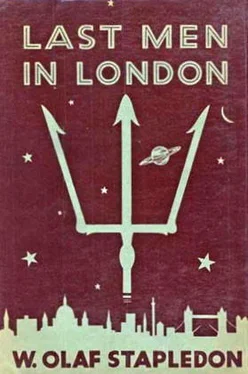This power of controlling the movements of adults was one of Paul’s most exciting early triumphs. It was a limited and erratic power. All too often the great creature refused to obey, or actually turned the tables and compelled him to do what he did not want to do. Altogether these adults were a very perplexing fact in Paul’s early life. In some ways they were so necessary and reliable, in others so inconsequent and even noxious. Of course, Paul did not consciously make these generalizations, but they were implied in his behaviour. Thus in certain respects, such as physical care and protection, he trusted the adult absolutely, but in others he learned to expect nothing but misunderstanding and ridicule. In yet other respects he himself was so influenced by the prestige suggestion which these mighty beings brought to bear on him, that many of their unintelligible admirations and taboos gradually took root in his own nature. For instance, he slavishly accepted their views about sex. Very early in his childhood he had begun to take an interest in those parts of his body which adults pointedly ignored. He had discovered that a vague pleasure occurred when these organs were touched. But long before he was told that it was wicked and dangerous to take any notice of them, he already profoundly felt that it was so, merely through the awkwardness that beset adults whenever he referred to them. Had Paul been born a young baboon or chimpanzee he would at least have escaped the agony of mind and waste of energy which, as I shall tell later, he, like so many of his kind, incurred through this too ready acceptance of adult standards. Meanwhile it was inevitable that, before sex became an imperious need, Paul should adjust himself to adult standards in this as in so many other respects. Adults were objects which one had to learn to cope with, just as one had to learn to cope with dogs and chairs and fire. Sometimes one failed and suffered for it, but on the whole one succeeded.
I must not, however, dwell on the process by which Paul gradually mastered these earliest problems. In all his adventures, I, his parasite, tasted his success and failure. I suffered all his bumps, scratches and scaldings. I saw beforehand what was impending. I saw both that it was inevitable and that with a little more skill it might have been avoided. Had I chosen, I might have played the mother to him and saved him from many a disaster, but it was better to let him learn. During his earliest Years I refrained from any kind of influence, since it was important that he should develop normally up to a certain stage.
Little by little Paul’s world crystallized into extensive patterns. No longer a meagre and obscure flux of dream-like forms, it became a more or less reliable world of ‘common sense’, a house and garden, with surrounding continents made up of other houses and gardens, streets and fields. Gradually also he was able to look backwards not merely into a confused cloud of pastness but along a brief but orderly vista of nights and days.
But with this gradual increase of order in his daylight world, Paul became more and more distressed by that other chaotic world which swallowed him at night. When the light was put out and he was left alone in bed, the whole reliable order vanished. Even if he kept his eyes shut, terrifying shades confronted him with their vague and shifty forms. He saw animal heads and shoulders, and stealthily moving gorilla arms. They kept changing from one thing into another thing. They were unintelligible and therefore terrible.
Still worse, sometimes the seething confusion of shadows would be dominated by a single staring eye. Paul could not escape it. Wherever he looked, there it was, watching him. Perhaps it was God’s eye, seeing right through him, coldly noting all his most secret wickedness. Perhaps God had done away with the world of day because Paul had been so naughty in it. Perhaps there was nothing now but Paul and God and the close dark, with one streak of light pretending to be under the door, to keep up appearances. Somehow the Eye seemed to him both very wise and very stupid, a vindictive clever thing, that intended to kill him just by gazing at him, for no reason but that he did not please the Eye. Sometimes Paul was so terrified that he screamed. Then an exasperated grown-up would appear and ask what on earth was the matter. He could never tell, for grown-ups were somehow blind to the night world, and would think him silly. But to me, Paul’s trouble was very real, and also intelligible. To Paul, though he knew it not, the night was the womb. When he was very sleepy, it promised rest and peace; but when he was not sleepy, he regarded it as a well of blackness, stuffiness, formlessness, negation. It threatened to swallow him back from the bright orderly extra-uterine world of day, with its complicated geography, its reliable persons, and its winds that came with obscure messages from still wider spheres.
Throughout Paul’s life this contrast of the day world and the night world lay at the back of his thinking and feeling, influencing it, perplexing it. As he grew older, however, the two worlds seemed to interpenetrate more and more, until at last he found that there was a day view of everything and a night view also. But which was the true view? Perhaps the night view of things was in fact just nightmare, a bad dream. But then perhaps it was the other way round. Perhaps the whole day universe was just a foolish dream of the eternal foetus imprisoned in the eternal womb. In early days, of course, Paul never thought of the problem in this way, but I myself could see how the obscure movements of his mind were related to the forgotten experience of birth.
There was one aspect of the night which seemed even to the child Paul very different from the night which imprisoned him in bed, namely the starry sky. He seldom saw it, but even a brief glimpse of it would have lasting effect on him. It gave him a sort of calm elation which fortified him against the terrors of darkness, and would sometimes even last into the next day, soothing his troubles and tempering his joys. This experience, which played an important part in Paul’s life, was not simply a spontaneous outcome of his own nature. It was in part due to my presence in his mind, though in part also to his native disposition. Throughout his life, these occasions on which he was able to regard the night sky had a very considerable effect on me, the imprisoned and often fatigued observer of all his experience. They afforded me refreshing glimpses of something common to his world and my own. When I had become too deeply immersed in the minutiae of Paul’s behaviour, and was beginning to feel your world more real than mine, the sight of the stars, even through the inefficient eyes of a member of your species, would recall to me with great vividness the Neptunian plains and dwarf jungles, the sky-piercing towers and bland inhabitants of my own far-future world. This vivid recollection would rekindle in me the still, flame-like ardour which is the spirit of our doomed but unperturbed community. And the serene emotion which then surged through me would infect Paul also, lending a tone to his experience, which, though he could never properly account for it, he came in time to recognize as in some manner a gift from a source beyond his mundane nature. I well remember the hush of surprise and gurgle of delight with which the child Paul first greeted the stars. He was in his mother’s arms. He stretched out his own fat arms and turned his head slowly from side to side, surveying the heaven. On another occasion, much later, when he was being brought home from a Christmas party, so tired that he could hardly walk, a brilliant night sky overpowered him so that he burst into tears of uncomprehending joy.
As the years advanced, Paul’s sense that the starry night was present even by day became an increasing influence in his life. This was partly my doing; for I soon found that by giving him visual images of the night sky in the midst of mundane situations I could help him to regard the affairs of himself and his companions with Uranian detachment. There was an early stage in his development when, through this action of mine, he came to think of the universe as a sandwich made of the upper and nether night, with, between them, the meat of day. Below was the horrible darkness and confusion and closeness which he encountered in his stuffy bedroom. Above was the high mystery of the stars. Between was the world of familiar things.
Читать дальше












